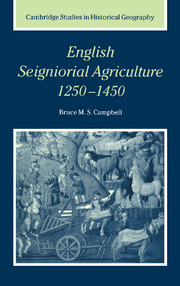Book contents
- Frontmatter
- Contents
- List of figures
- List of tables
- Preface and acknowledgements
- Abbreviations
- Weights, measures, values, and boundaries
- 1 Introduction: agriculture and the late-medieval English economy
- 2 Sources, databases, and typologies
- 3 The scale and composition of the seigniorial sector
- 4 Seigniorial pastoral production
- 5 Seigniorial arable production
- 6 Crop specialisation and cropping systems
- 7 Arable productivity
- 8 Grain output and population: a conundrum
- 9 Adapting to change: English seigniorial agriculture 1250–1450
- Appendix 1 Demesne-level classification of husbandry types
- Appendix 2 Demesnes represented in the Norfolk accounts database
- Appendix 3 Demesnes represented in the FTC accounts databases
- Consolidated bibliography
- Index
- Cambridge Studies in Historical Geography
7 - Arable productivity
Published online by Cambridge University Press: 20 October 2009
- Frontmatter
- Contents
- List of figures
- List of tables
- Preface and acknowledgements
- Abbreviations
- Weights, measures, values, and boundaries
- 1 Introduction: agriculture and the late-medieval English economy
- 2 Sources, databases, and typologies
- 3 The scale and composition of the seigniorial sector
- 4 Seigniorial pastoral production
- 5 Seigniorial arable production
- 6 Crop specialisation and cropping systems
- 7 Arable productivity
- 8 Grain output and population: a conundrum
- 9 Adapting to change: English seigniorial agriculture 1250–1450
- Appendix 1 Demesne-level classification of husbandry types
- Appendix 2 Demesnes represented in the Norfolk accounts database
- Appendix 3 Demesnes represented in the FTC accounts databases
- Consolidated bibliography
- Index
- Cambridge Studies in Historical Geography
Summary
Productivity as an issue
The productivity of arable husbandary has been one of the most debated aspects of medieval agriculture. In part this reflects the abundance of detailed yield information provided by manorial accounts, which is unmatched in quantity and quality until the nineteenth century, but it is also a function of the importance attached to the issue by those explanatory models of medieval socio-economic development which emphasise the adverse consequences of over-expansion when undertaken in conjunction with under-investment. Nor, once productivity decline had set in, was it easily reversed: there was no ‘quick fix’ to reduced nitrogen balances and depleted phosphorus levels. A more optimistic interpretation is offered by those who stress the growing commercialization of the medieval economy and the productivity gains which thereby accrued from involution, innovation, and market specialisation. That is not to say that ecological limits were never transgressed, but rather that such transgressions were more the exception than the norm with the result that there was a net overall gain in land productivity. On this line of reasoning the crucial limits to sustained productivity growth lay less within the agricultural sector per se than within the wider commercial economy. Once recession replaced expansion, markets contracted, and trade subsided, so land productivity, with certain notable exceptions, also declined, not to recover until the next wave of commercial and demographic growth in the sixteenth century.
- Type
- Chapter
- Information
- English Seigniorial Agriculture, 1250–1450 , pp. 306 - 385Publisher: Cambridge University PressPrint publication year: 2000

